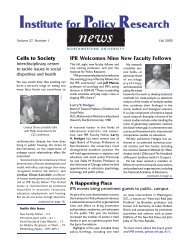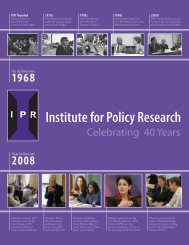pdf - Institute for Policy Research - Northwestern University
pdf - Institute for Policy Research - Northwestern University
pdf - Institute for Policy Research - Northwestern University
You also want an ePaper? Increase the reach of your titles
YUMPU automatically turns print PDFs into web optimized ePapers that Google loves.
started data collection on her new<br />
longitudinal project examining young<br />
people’s online abilities. This project<br />
looks at how young people incorporate<br />
technology into their everyday lives and<br />
whether these new digital media are<br />
leveling the playing field <strong>for</strong> youth or<br />
increasing the digital divide. Hargittai is<br />
working on a conceptual framework that<br />
accounts <strong>for</strong> these differences. She is<br />
also collecting a unique data set about a<br />
diverse group of young people’s Internet<br />
uses to illustrate existing differences.<br />
Funding <strong>for</strong> the project has been<br />
provided by the John D. and Catherine<br />
T. MacArthur Foundation.<br />
Hargittai is also looking at Internet use<br />
among older adults with Jeremy Freese<br />
and Salvador Rivas of the <strong>University</strong> of<br />
Wisconsin-Madison. Investigating the<br />
link between cognition and Internet<br />
use, the three researchers find strong<br />
evidence that people with higher IQs<br />
(cognitive skills) are best able to take<br />
advantage of online tools that help older<br />
adults to navigate social benefits and<br />
ultimately make complicated decisions.<br />
Despite the importance of technological<br />
standards in driving economic growth,<br />
there has been little research on the role<br />
of public policy in the development of<br />
standards. Leading researchers in public<br />
policy standards address this research<br />
gap in Standards and Public <strong>Policy</strong><br />
(Cambridge <strong>University</strong> Press), edited<br />
by strategy and management professor<br />
Shane Greenstein and Victor Stango of<br />
Dartmouth College. In it, they examine<br />
whether markets choose efficient<br />
standards, the effect of standards<br />
organizations on the development of<br />
standards, and appropriate public policy<br />
on the issue of standards. Greenstein is<br />
Elinor and Wendell Hobbs Professor of<br />
Management and Strategy.<br />
In a project on how candidates use<br />
the Web to win elections, James<br />
Druckman and two colleagues developed<br />
a theoretical framework <strong>for</strong> studying<br />
politicians’ campaigns on the Web that<br />
accounts <strong>for</strong> politically strategic aspects of<br />
Web-based campaigns and novel technical<br />
elements. They then conducted a content<br />
analysis of more than 700 candidates’<br />
Web sites over three election cycles. They<br />
included additional data on candidate and<br />
district characteristics, permitting them<br />
to study how candidates campaign on the<br />
Web, how Web campaign strategies differ<br />
from other types of media campaigns,<br />
why candidates’ Web sites differ from one<br />
another, how campaign Web sites have<br />
changed over time, and what effect Web<br />
campaigns might have in the future. Some<br />
of their findings have centered on showing<br />
the conditions under which campaigns<br />
“go negative” against their opponents<br />
and those technological features that<br />
candidates use or avoid and why.<br />
While historians of American urban<br />
development have documented how<br />
powerful actors from mayors to developers<br />
shaped the history of American cities,<br />
the men and women whose technical<br />
and technological models laid out basic<br />
assumptions about the nature of city life to<br />
guide many urban decisions have been at<br />
most minor characters in these accounts.<br />
Jennifer Light, a historian of in<strong>for</strong>mation<br />
systems, has begun a new research project<br />
that is using geographical in<strong>for</strong>mation<br />
systems (GIS) in an analysis of the<br />
urban renewal program. In particular,<br />
she is looking at how the maps that<br />
were central to federal and local policy<br />
decisions about urban redevelopment, and<br />
the mapmakers who created them, shaped<br />
the fate of several U.S. cities. Light wants<br />
to show how historians can employ GIS<br />
and quantitative data to complement<br />
qualitative, archivally-based inquiry in<br />
their field of study.<br />
Some findings by<br />
Druckman and<br />
his colleagues have<br />
centered on showing<br />
the conditions under<br />
which campaigns “go<br />
negative” against their<br />
opponents and those<br />
technological features<br />
that candidates use or<br />
avoid and why.<br />
www.northwestern.edu/ipr 31
















